Memo Published December 17, 2020 · 9 minute read
How COVID-19 Made Higher Education Value a Top Priority
Tamara Hiler


More from this series Repository of Third Way’s Higher Education Public Opinion Research
View seriesWhile questions about the value of higher education have bubbled under the surface for years, the COVID-19 pandemic that hit the world in 2020 propelled this conversation into national headlines, with students and families openly asking their institutions and policymakers: “Is college worth it?” To better understand the shifting perceptions surrounding questions of value, Third Way, in partnership with Global Strategy Group, conducted a survey of 1,000 nationwide voters—with oversamples of Black voters, Hispanic voters, and institutional leaders—to dig into exactly how the COVID-19 pandemic has changed opinions on whether college pays off and what actions institutions and the federal government should take to ensure all students and taxpayers see a long-term return on investment from seeking an education beyond high school.1
Not surprisingly, the survey revealed that the concept of higher education value is more important to voters than it has ever been, and that the salience of this topic is gaining political ground among more well-known higher education policy ideas like making college tuition free. And while both likely voters and institutional leaders express optimism for the sector and its recovery, they also share an acknowledgement of colleges and universities’ obligation to address higher education’s shortcomings and improve its value for all students. The following analysis lays out our four main takeaways from the survey’s findings.
Takeaway 1: Value of higher education remains high despite a slight shift in perception in light of the pandemic.
With rising tuition rates, national debates around free college, and a renewed focus on college closures around the country, the conversation around the cost and payout of earning a college degree is not new. However, like every other industry, the COVID-19 pandemic brought the higher education sector to a reckoning, shining a spotlight on the question of higher education’s value and its long-term viability. The biggest question on the table is whether the pandemic will fundamentally change when students choose to enroll at college or whether they forgo postsecondary education altogether. Our survey results reveal that the majority of institutional leaders and likely voters across the board overwhelmingly rate the return on investment of a degree after high school education as either “excellent” or “good,” with only a minimal shift in this belief since the pandemic began:
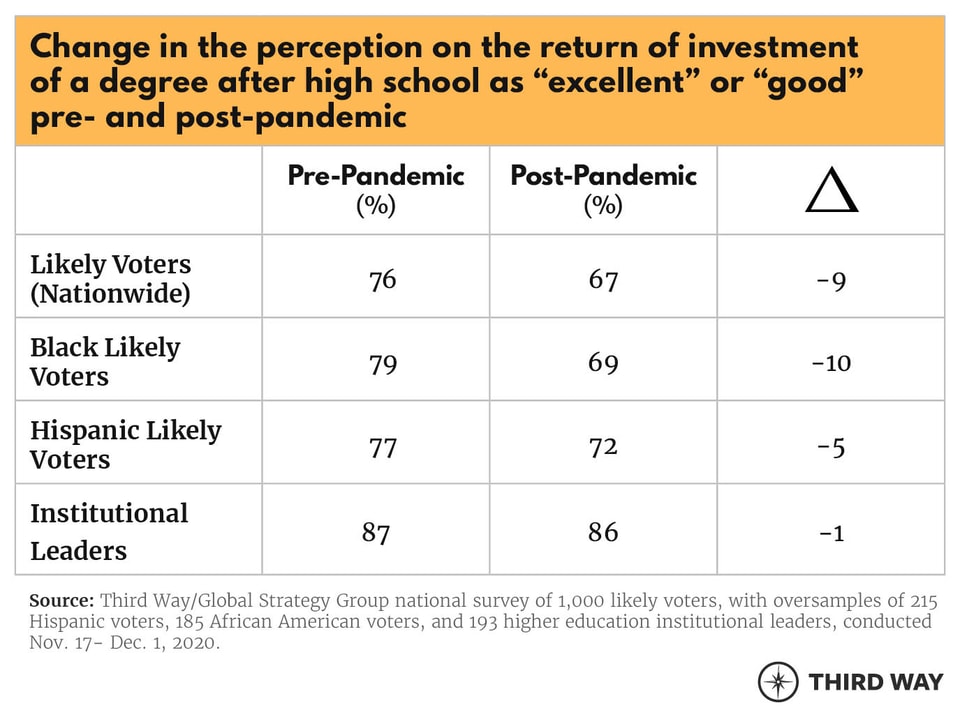
In fact, when asked, “Do you believe the value of a degree after high school has changed in the last year?” a majority of respondents indicated that it has “either stayed the same” or “has become more valuable,” with 63% of nationwide likely voters, 64% of Black likely voters, and 72% of institutional leaders holding this view. Hispanic voters were the most likely to answer this question as a coin toss, with 51% saying the value of a college degree “has stayed the same” or “become more valuable,” and 49% forecasting that it “has become less valuable.”
Overall, however, this round of public opinion research confirms what Third Way has found through its survey work in the past—that Americans continue to see the competitive advantage a college degree affords in today’s economy and want to see the federal government invest in the sector, a belief that remains steadfast as the nation stares down a recession post-pandemic.2Specifically, when asked which statement pair comes closer to their view, 57% of likely voters nationwide, 72% of Black likely voters, 61% of Hispanic likely voters, and 61% of institutional leaders selected the statement that “College degrees have become increasingly necessary for workers to stay competitive in the new economy, and the federal government should invest in strengthening the American workforce,” compared to the statement that “Many Americans have good paying jobs and stable careers without college, and the federal government should not spend more money to subsidize the privileged few.”
Takeaway 2: COVID-19 has increased higher education value’s standing as a top priority for voters.
In addition to voters and institutional leaders continuing to see why postsecondary education remains valuable post-pandemic, our survey revealed that the pandemic has actually increased the salience of this issue, making the issue of higher education value a top priority for voters and institutional leaders alike:
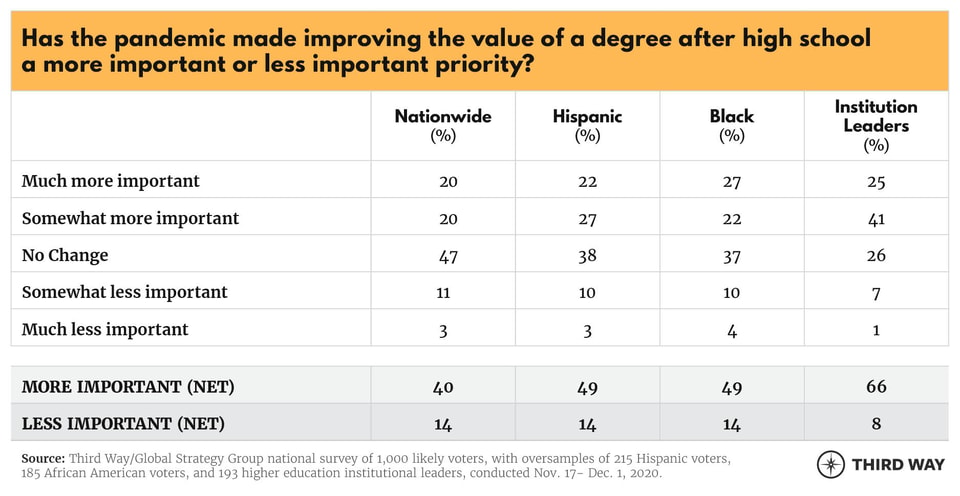
Notably, value has become more important to voters than one of the most prevalent conversations dictating the higher education discourse: free college. Once again, voters have made clear that people don’t expect college to be free, even in the face of a looming recession.3Rather, they simply expect to get a fair return on what they paid.
- 73% of likely voters (including 61% of Black and 58% of Hispanic likely voters) believe that colleges’ primary focus should be “on delivering degrees that set students up for success,” compared to just 27% who believe that “It’s more important than ever to make college free so that students can get a foothold in their careers.”
- In addition, 42% of likely voters (including 53% of Black and 47% of Hispanic likely voters) said improving the value of higher education has become more important to their vote over the last couple of years, with only 10% (and 11% of Black and 13% of Hispanic voters) saying it has become less important. In comparison, 30% of likely voters (and 45% of Black and 40% of Hispanic likely voters) said making college free has become more important, with 26% (and 15% of Black and 23% of Hispanic voters) saying it has become less important.
- Lastly, by a whopping two-to-one margin, 66% of likely voters (and 73% of Black and 68% of Hispanic likely voters) said it is important to ensure that students who receive a degree are able to repay their loans, compared to only 31% of likely voters (and 50% of Black and 43% of Hispanic likely voters) who think it is important to make college free to all who are admitted. In fact, making college free to all who are admitted ranked dead last in a list of goals voters indicated were most important to them personally.
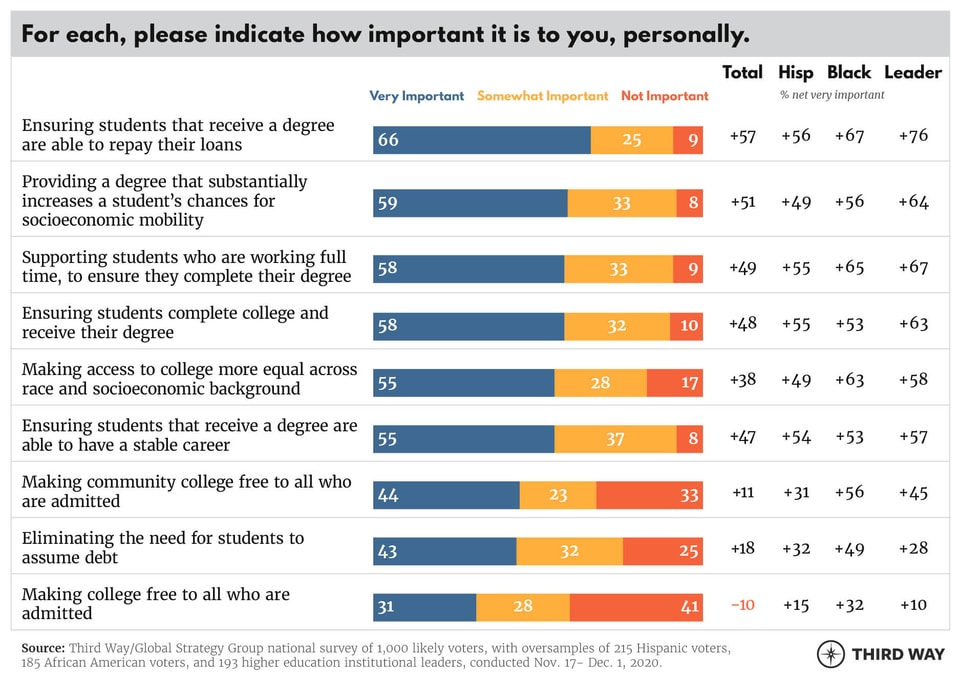
Takeaway 3: Voters and institutional leaders strongly believe institutions have an imperative to deliver better and more equitable outcomes.
It’s clear that improving higher education’s value matters to likely voters as they think about the sustained future of the higher education sector and its ability to continue delivering a return on investment for the students who enroll. In general, respondents indicated that they’d like to see the higher education system become more affordable and outcomes-driven for students. More than two-thirds of likely voters, for example, said that both “making college more affordable to reduce student debt” (70%) and “ensuring that students receive a degree that puts them on a path to education success” (67%) are the two goals of higher education that are most important to them personally. In order to meet those goals, there is a strong belief that institutions should and could be doing more to drive the improvement voters seek. Interestingly, institutional leaders are the first to acknowledge the role institutions themselves must play to secure greater value for students and taxpayers across the board, acknowledging at strong margins that it is higher education’s job to help students pay back their loans, gain skills, and graduate—and that there needs to be a bigger focus on not just getting students to college, but through college as well.
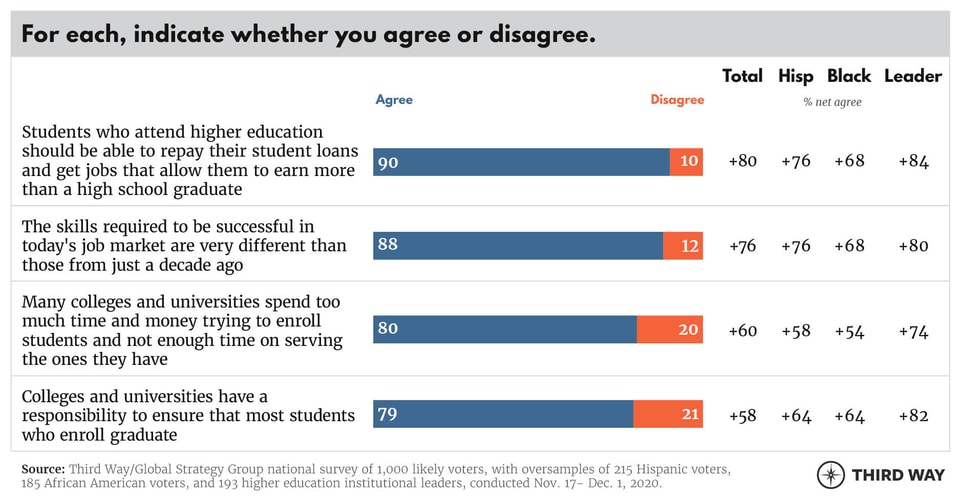
Respondents also indicated that institutions need to place a greater emphasis on making sure all students have access to the opportunities and value a college education affords. Many believe that colleges and universities have a responsibility to improve equitable access and that they have room to grow in this area.
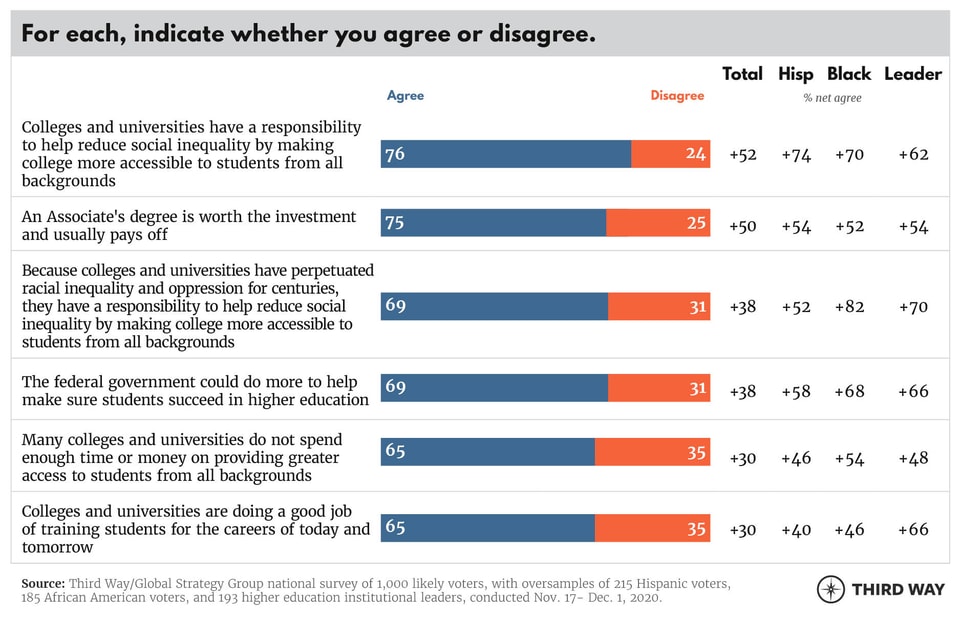
Takeaway 4: Institutions indicate a willingness to take steps to improve value.
Luckily, there appears to be widespread acknowledgement from institutional leaders that they must make sure the courses and degrees they offer deliver a return on investment for students, especially as the country faces down another recession. For example, when asked which statement pair they agreed with more, institutional leaders acknowledged by a nearly three-to-one margin that “Colleges and universities need to keep up with the needs of the pandemic economy and offer courses and degrees that allow students to be successful after graduation” (74%), compared to only 26% of institutional leaders who said, “The student must keep up with the needs of the pandemic economy and make informed choices on what college or university to attend and what classes to take to be successful after graduation.”
Respondents from all backgrounds also acknowledged that when it comes to “ensuring a college degree is valuable during and after the coronavirus pandemic,” colleges and universities themselves have the most power, followed by institutional leadership of colleges and universities, professors and faculty, and—with the least power—students.
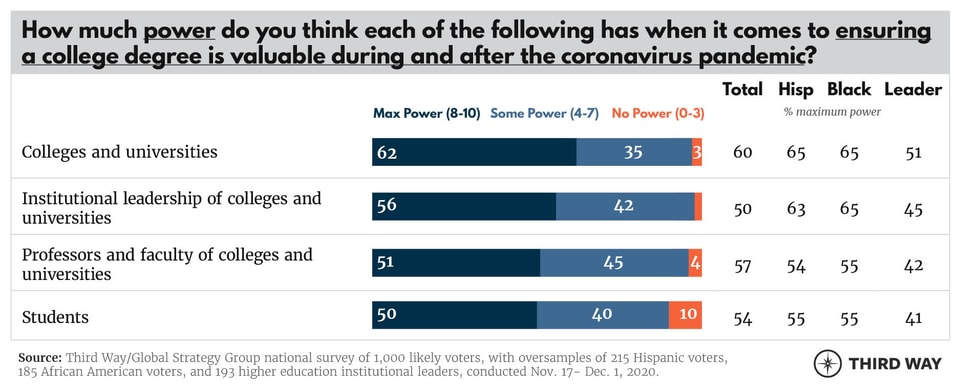
Lastly, when it comes to the steps institutions need to take to see these improvements in value, institutional leaders say they need to do a much better job at creating greater transparency for students and graduates about post-enrollment trajectories, but also provide necessary support systems and shift resources to focus on outcomes for all students.
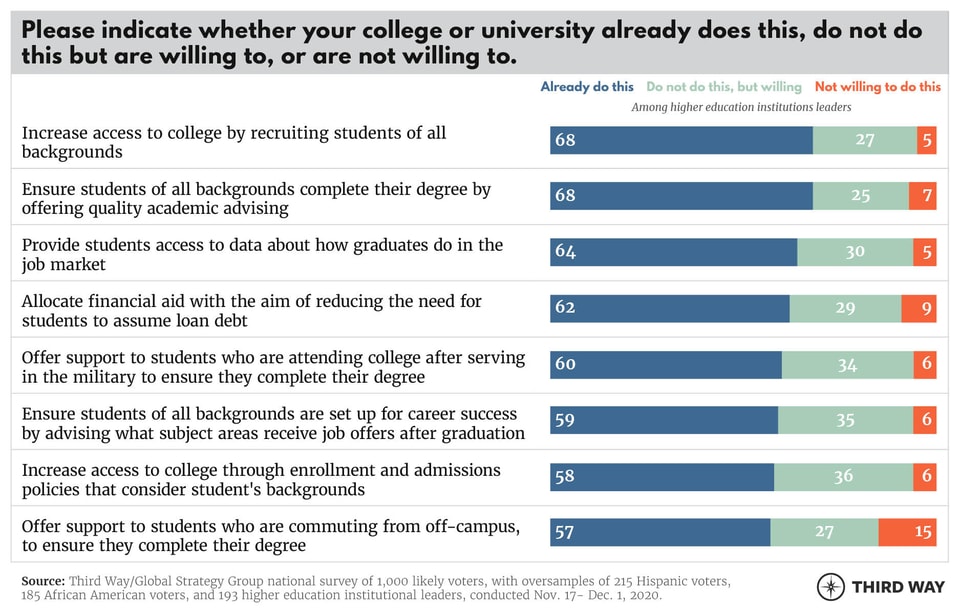
Conclusion
The country has been through a lot in 2020, and the higher education sector has faced some of its biggest challenges ever as it looks to stay afloat amid declining enrollment numbers, the likely tightening of state budgets, and a prolonged shift to online learning models. However, the pandemic has also presented a number of opportunities to have more difficult conversations about the important role postsecondary education can and will play in helping our country dig out from the COVID-19 pandemic. It is clear that voters still see the value of higher education, but are rightfully emboldened by the pandemic to demand more from the sector to ensure all students and taxpayers see a return on their investment and can earn the degrees and gain the skills they need to find economic stability. Voters understand that value is the paramount policy question that institutional leaders and policymakers need to solve as we look to create better and more equitable outcomes across the system. This will not be an effort that any one stakeholder can undertake alone, but one through which institutional leaders acknowledge that colleges and universities must take a hard look at their own practices and refocus on making value a greater priority moving forward. Our survey indicates that institutional leaders are willing to roll up their sleeves and get to work—but it will be incumbent on policymakers and students to hold institutions accountable for creating more value for all.
Methodology
Global Strategy Group conducted a survey of 1,000 2020 voters nationwide, with oversamples of 215 Hispanic 2020 voters, 185 African American 2020 voters, and 193 higher education institutional leaders from November 17 through December 1, 2020. The precision of online surveys is measured using a credibility interval, and in this case, the interval is 3.1%. The margin on the subsamples is larger. Care has been taken to ensure the geographic and demographic divisions of the electorates are properly represented.
Full toplines of the survey can be found here.
